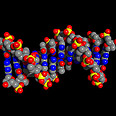
Some 3.5 million of today's Ashkenazi Jews - about 40 percent of the total Ashkenazi population - are descended from just four women, a genetic study indicates.
Those women apparently lived somewhere in Europe within the last 2,000 years, but not necessarily in the same place or even the same century, said lead author Dr. Doron Behar of the Rambam Medical Center in Haifa, Israel.
He did the work with Karl Skorecki of the Technion-Israel Institute of Technology and others.
Each woman left a genetic signature that shows up in their descendants today, he and colleagues say in a report published online by the American Journal of Human Genetics. Together, their four signatures appear in about 40 percent of Ashkenazi Jews, while being virtually absent in non-Jews and found only rarely in Jews of non-Ashkenazi origin, the researchers said.
They said the total Ashkenazi population is estimated at around 8 million people. The estimated world Jewish population is about 13 million.
Ashkenazi Jews are a group with mainly central and eastern European ancestry. Ultimately, though, they can be traced back to Jews who migrated from Israel to Italy in the first and second centuries, Behar said.
'Their descendants left a legacy'
Eventually this group moved to Eastern Europe in the 12th and 13th centuries and expanded greatly, reaching about 10 million just before World War II, he said.
The study involved mitochondrial DNA, called mtDNA, which is passed only through the mother. A woman can pass her mtDNA to grandchildren only by having daughters. So mtDNA is "the perfect tool to trace maternal lineages," Behar said Thursday in a telephone interview.
His study involved analyzing mtDNA from more than 11,000 samples representing 67 populations.
Mike Hammer, who does similar research at the University of Arizona, said he found the work tracing back to just four ancestors "quite plausible... I think they've done a really good job of tackling this question."
But he said it's not clear the women lived in Europe.
"They may have existed in the Near East," Hammer said. "We don't know exactly where the four women were, but their descendants left a legacy in the population today, whereas ... other women's descendants did not."
Behar said the four women he referred to did inherit their genetic signatures from female ancestors who lived in the Near East. But he said he preferred to focus on these later European descendants because they were at the root of the Ashkenazi population explosion.















